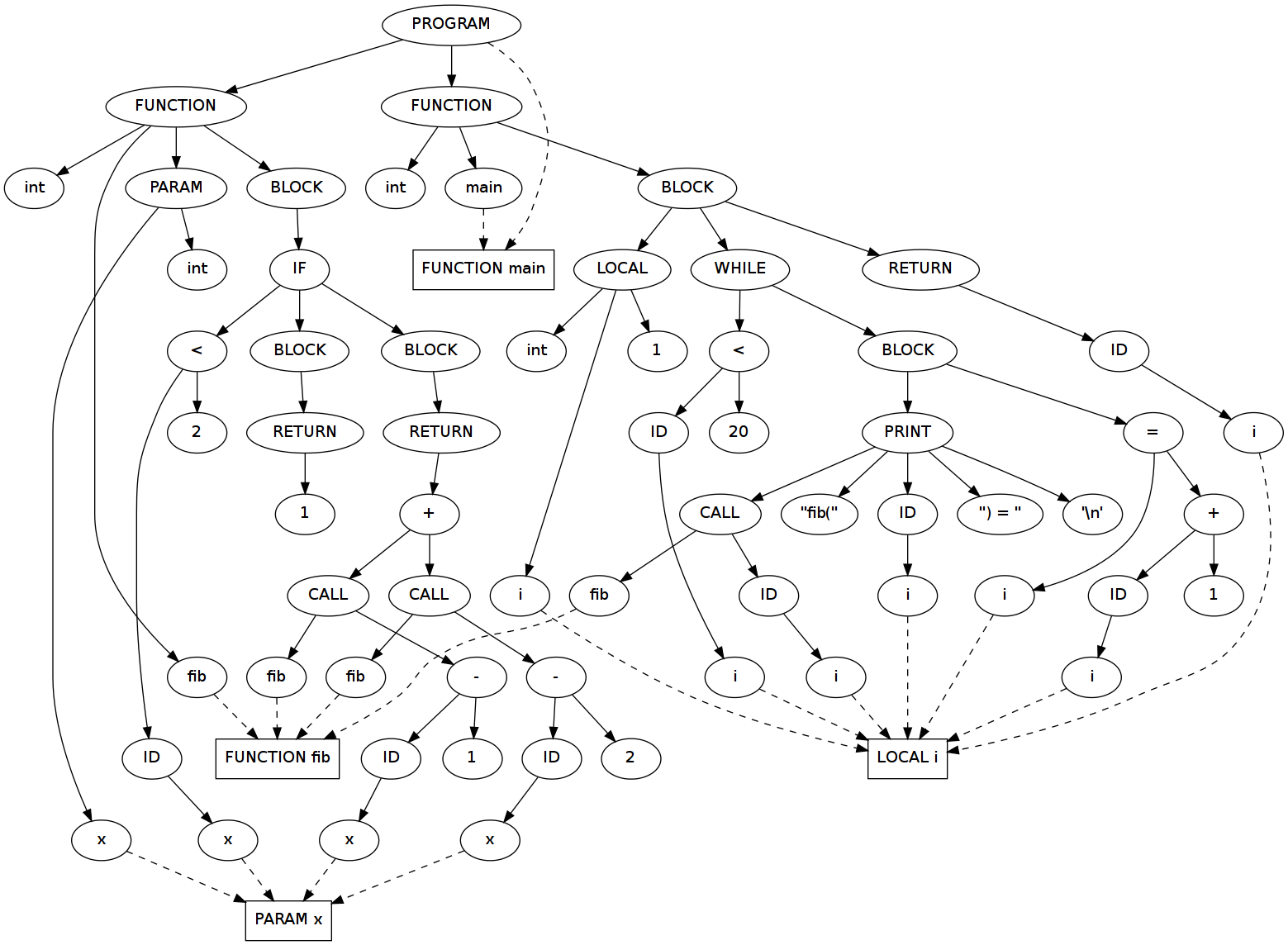This is a Java-implemented compiler for a miniature programming language called "C Minor." The Makefile generates a Java program which reads C Minor code as input and prints compiled AT&T-syntax x86 assembly code as output, or else reports errors on ill-formed input.
This project was completed on May 10, 2013 for a university compilers course. It is released under an MIT license, except for any library source code covered by its own license.
The Java Cup (java_cup/) and JFlex (jflex/) tools are used to generate the
compiler's lexer and parser classes and are both included with this project in
conformance with their respective licenses.
This project was developed in a Linux environment, and although the source code
is written in portable Java, the peripheral scripts and Makefile may depend on
commands or files not present on every system. These include dot, tempfile,
xdg-open.
Of course, you must have javac, java, and make installed to compile and execute
the program (ant is not used).
The Makefile provided contains rules for generating the C minor compiler from
JFlex, Java Cup, and Java source files as well as rules for compiling test
inputs using the generated compiler. All of the compiler code resides in the
cminor Java package, and the main class which serves as the C Minor compiler is
cminor.Compiler.
In order to build cminor.Compiler from its sources, simply use
make
Once the compiler has been built, it is invoked using
java cminor.Compiler [options]
The C Minor compiler has a number of different options and modes. These options
can be used to control whether the compiler reads from stdin or from a file,
writes code to stdout or a file, and generates x86 code or dot code for
visualizing the abstract syntax tree. Without any arguments the compiler reads
C Minor from stdin and sends compiled x86 code to stdout if the input is valid.
Errors are otherwise reported on stderr. In order to see all of the available
options, use
java cminor.Compiler -h
The project comes with a number of tests which were used to validate the
behavior and features of the compiler. These files are all under the test/
directory. The directory test/ast/ contains a set of over 40 tests which
demonstrate various features of the compiler. For any test file in this directory,
use
make test/ast/<filename>
to attempt to use the C Minor compiler to produce x86 code from the
corresponding .cm file, assemble it, and link it into an executable.
There is another test in the test/ms/ directory which pulls together several
aspects of the project. It is the Fibonacci program provided for the syntax
analysis phase of the project. To compile it, use
make test/ms/test
and then use
./test/ms/test
to verify that it prints out the first 20 or so Fibonacci numbers.
The scripts/ directory contains a number of scripts which abbreviate certain
modes of the C Minor compiler to a single command. For example, the script
scripts/resolve reads a C Minor file, prints its contents, and uses the C Minor
compiler to generate dot code for displaying the abstract syntax tree of the
input program including nodes for resolved symbols. It then uses the dot
command to produce an image of the tree and opens it in the user's preferred
application using xdg-open.
The compiler is written in Java and makes extensive use of the visitor pattern. This design decision is a result of the benefits of having closely-related code for each compiler phase kept in the same class file instead of spread out accross several abstract syntax tree node class files.
The project is separated into the following phases:
- Lexing (sends tokens to the parser using
jflex) - Parsing (builds an abstract syntax tree using
java_cup) - Symbol resolution (resolves identifiers and other symbols in the AST)
- Type checking (resolves and validates expression types and performs other semantic analyses)
- Code generation (assuming the AST has been fully validated and resolved, proceeds to generate x86 code)
For the sake of simplicity, the generated code simulates a stack machine. It
should be considered pre-optimization assembly code. All return and expression
values are passed through %eax; all function arguments are passed through the
stack.
All intended functionality appears to be working, and the program works on all test inputs provided. The experience of using the compiler suggests that it is generally quite sound, but of course there is no guarantee that there are no hidden bugs, that there isn't a glitch in the matrix, and that the entire universe isn't just a hologram. Seriously though, it's quite solid.
The compiler implements (or at least supposes to implement) the following features:
- Error checking during the scanning phase
- Error recovery during the parsing phase
- Input file location information for errors in the input and descriptive error messages for semantic errors
- Validation that a
mainfunction exists with the correct signature - Validation that functions with non-
voidreturn types return values in all branches of execution - Detection of unreachable statements
- Use of a string table to minimize the number of string literals included in the resulting program
- Packing of constant values, at compile time, into the format strings used by
the calls to
libc'sprintfwhich underlie C Minorprintstatements - Ensurance that the literal arguments to
printcannot be used to insert extra format specifiers that break the underlyingprintfformat specifiers - Printing of
trueandfalsefor boolean values - Implementation of lexical scoping rules
- Control flow statements
if,else, andwhile - Short-circuited logical operators
- Awesomeness
